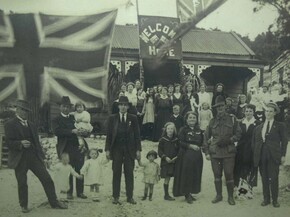DAWSON, George Byron Matthew
| Service Number: | 5007 |
|---|---|
| Enlisted: | 14 April 1916 |
| Last Rank: | Private |
| Last Unit: | 24th Infantry Battalion |
| Born: | Gladstone, Tasmania, Australia, 29 October 1896 |
| Home Town: | Queenstown, West Coast, Tasmania |
| Schooling: | Not yet discovered |
| Occupation: | Labourer |
| Died: | 9 February 1982, aged 85 years, cause of death not yet discovered, place of death not yet discovered |
| Cemetery: | Not yet discovered |
| Memorials: |
World War 1 Service
| 14 Apr 1916: | Enlisted AIF WW1, Private, 5007, 24th Infantry Battalion | |
|---|---|---|
| 28 Jul 1916: | Involvement Private, 5007, 24th Infantry Battalion, --- :embarkation_roll: roll_number: '14' embarkation_place: Melbourne embarkation_ship: HMAT Themistocles embarkation_ship_number: A32 public_note: '' | |
| 28 Jul 1916: | Embarked Private, 5007, 24th Infantry Battalion, HMAT Themistocles, Melbourne |
Help us honour George Byron Matthew Dawson's service by contributing information, stories, and images so that they can be preserved for future generations.
Add my storyBiography contributed by Stephen Brooks
George Byron Matthew Dawson 24th Battalion AIF, was returned to Australia suffering with frostbite during August 1917.
His two brothers had died during the war, Jack McKay Dawson in Egypt from Gallipoli wounds and Henry George Dawson died in Belgium during 1916. Henry was a survivor of the Mount Lyell mining disaster of 1912, near Queenstown, in which 42 miners had perished.
George was accorded a huge welcome home in Queenstown in November 1917 and the local papers reported on it, under the heading,
PRIVATE G. B. M. DAWSON RETURNS. ENTHUSIASTIC WELCOME.
“An enthusiastic welcome home was tendered to Private G. Dawson, son of Mrs M. J. Carey, of Peter Street, Queenstown. There was a very large crowd assembled at the station for the arrival of the young soldier, amongst whom was many of the leading citizens of the town. As the train was nearing the station the band, under Bandmaster Constantine, played a number of inspiriting marches, and concluded with the familiar strains of ‘See the conquering hero.’ On the arrival of the train. Private Dawson was met by his relatives and friends, afterwords Mr. Archd, Douglas, on behalf of the Warden, who was unavoidably absent, tendered him a civic welcome, and in a well-chosen speech spoke of the pride he and the public generally had in the boys who went abroad, and did their bit for their country. He made a feeling reference to the fact that Private Dawson was one of three worthy Dawson boys who had answered the call to duty, and very sad to relate the other two had paid the supreme sacrifice. That fact made the home coming of Private George Dawson the more impressive. They were delighted that he had been spared to come back to his home at Queenstown, where he had lived so many years, and was so well and favourably known. He trusted that he would be soon quite well again, and able to enter into the enjoyment which he so well deserved after serving his country faithfully for the past two yours. He called for three hearty cheers, and these were given in a most enthusiastic manner. The young soldier was then placed in the Chair of Honor and carried shoulder high up to the Post Office, the lams crowd of admirers following, and the band playing an appropriate march.
At the Post Office Private Dawson sincerely thanked the Council Clerk for the words of welcome that had been expressed by him and the public for the very enthusiastic welcome home that they had accorded him. He said that he felt that he had, simply done what he considered his duty, and for doing that he did not deserve the flattering reception that had been given him. Enthusiastic cheers were again given for Private Dawson, and also cheers for his mother. Quite elaborate decorations had been arranged in Peter Street, off Cutten Street, where flags of the Allied nations were hanging across the street. Stretched across the street at one part was a large banner with the words is red and while letters, ‘Welcome home.’ and at the home there was a neatly arranged and prettily decorated arch with the same words.
That this street was so well decorated was not to be wondered at, for it is in all probability the most patriotic in the whole of the Commonwealth. From some twenty residents no less than seventeen sons have gone to the front.”









